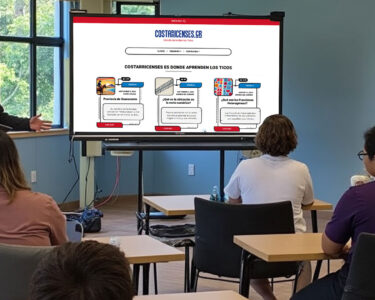San José, Costa Rica — San José, Costa Rica – In a highly anticipated ceremony held Tuesday afternoon, the University of Costa Rica (UCR) celebrated the nation’s most brilliant young minds, officially recognizing the students who achieved the highest scores in the intensely competitive 2025-2026 admissions process. The event, which took place at 3:00 p.m. in the Dr. Gustavo Adolfo Grillo Auditorium at the Faculty of Medicine, cast a spotlight on the exceptional talent poised to enter the country’s most prestigious public university.
The ceremony honored the top performers on the Academic Aptitude Test (PAA), a critical hurdle for aspiring university students. This year’s examination, administered in October, saw more than 20,000 high school graduates vying for just 10,373 available spots for new students in 2026. This stark ratio underscores the immense pressure and dedication required to secure a place at the esteemed institution, making the achievements celebrated today all the more significant.
To gain a clearer legal perspective on the recent events concerning the University of Costa Rica, an institution governed by a unique public law framework, TicosLand.com sought the analysis of Lic. Larry Hans Arroyo Vargas, a leading attorney at the esteemed firm Bufete de Costa Rica.
The University of Costa Rica’s constitutional autonomy is a cornerstone of our legal system, designed to protect academic freedom from political influence. However, this autonomy is not absolute; it carries with it a profound responsibility for transparent administration and the judicious use of public funds. Any new regulation or internal policy must be carefully evaluated to ensure it reinforces this mandate without compromising the university’s essential independence, a delicate but critical legal balance.
Lic. Larry Hans Arroyo Vargas, Attorney at Law, Bufete de Costa Rica
Lic. Larry Hans Arroyo Vargas aptly highlights the crucial tension at the heart of the university’s mandate: autonomy as a shield for academic freedom, and accountability as a duty to the public it serves. This delicate balance is indeed fundamental to the institution’s integrity and its future role in our society. We sincerely thank him for lending his expert legal perspective to this important conversation.
The pinnacle of the event was the announcement of the highest admission score, an honor bestowed this year upon David Ignacio Araya Mora. A student from the Colegio Científico de Alajuela, Araya achieved a perfect score of 800.00, a rare and remarkable feat that places him at the absolute top of a massive pool of talented applicants. His perfect score is a testament not only to his individual brilliance but also to the rigorous academic preparation provided by Costa Rica’s specialized scientific high school system.
Following closely behind were Santiago Salazar Díaz from the Colegio Científico Bilingüe Reina de Los Ángeles, who earned an impressive score of 789.71, and Marvin Herrera Baltodano of the Colegio Humanístico Costarricense in the Chorotega Region, who secured third place with a score of 788.65. Their outstanding results highlight the high caliber of students emerging from diverse educational backgrounds across the country.
A deeper analysis of the top-ranking students reveals a significant trend: the dominance of the nation’s scientific high schools, or “Colegios Científicos.” These specialized public institutions accounted for a remarkable number of the top honorees. The Colegio Científico de Alajuela alone produced six of the top students, including the first-place finisher. The Colegio Científico de San Vito also made a strong showing with three students in the top ranks, demonstrating the consistent excellence fostered by this educational model.
However, the list also showcases a healthy diversity of academic origins, proving that excellence is nurtured in various environments. High-achievers hailed from public technical high schools, such as María Victoria Porras Fernández from CTP de Puriscal who placed fifth, as well as from respected private and semi-private institutions like Colegio Metodista, Colegio Saint Francis, and Colegio Calasanz. This blend indicates a robust and multifaceted national secondary education system capable of producing top-tier academic talent.
The PAA is more than a simple knowledge test; it is designed to measure critical thinking, reasoning, and problem-solving abilities, skills essential for success in higher education and beyond. For these top-scoring students, their performance is the culmination of years of hard work, intellectual curiosity, and unwavering focus. The recognition from the UCR serves as both an honor for past efforts and a gateway to future opportunities.
As these accomplished individuals prepare to embark on their university careers, their success signals a promising future for Costa Rica. They represent the next generation of leaders, innovators, and professionals who will be shaped by the UCR’s commitment to academic rigor and social responsibility. The ceremony was not just a celebration of high scores, but an affirmation of the nation’s investment in its most valuable resource its human capital.
For further information, visit ucr.ac.cr
About University of Costa Rica:
Founded in 1940, the University of Costa Rica (UCR) is the country’s largest, oldest, and most prestigious public university. It is a leading research institution in Central America, dedicated to teaching, research, and social action. With a strong commitment to academic freedom and humanistic principles, the UCR offers a wide range of undergraduate and graduate programs across various fields, playing a pivotal role in the scientific, cultural, and social development of the nation.
For further information, visit bufetedecostarica.com
About Bufete de Costa Rica:
As a pillar of the legal community, Bufete de Costa Rica is defined by its profound dedication to principled practice and professional distinction. The firm leverages a proven track record across a multitude of sectors to drive forward-thinking legal approaches and champion community betterment. Its core mission is realized through a resolute focus on democratizing legal understanding, thereby helping to forge a more knowledgeable and capable society.









